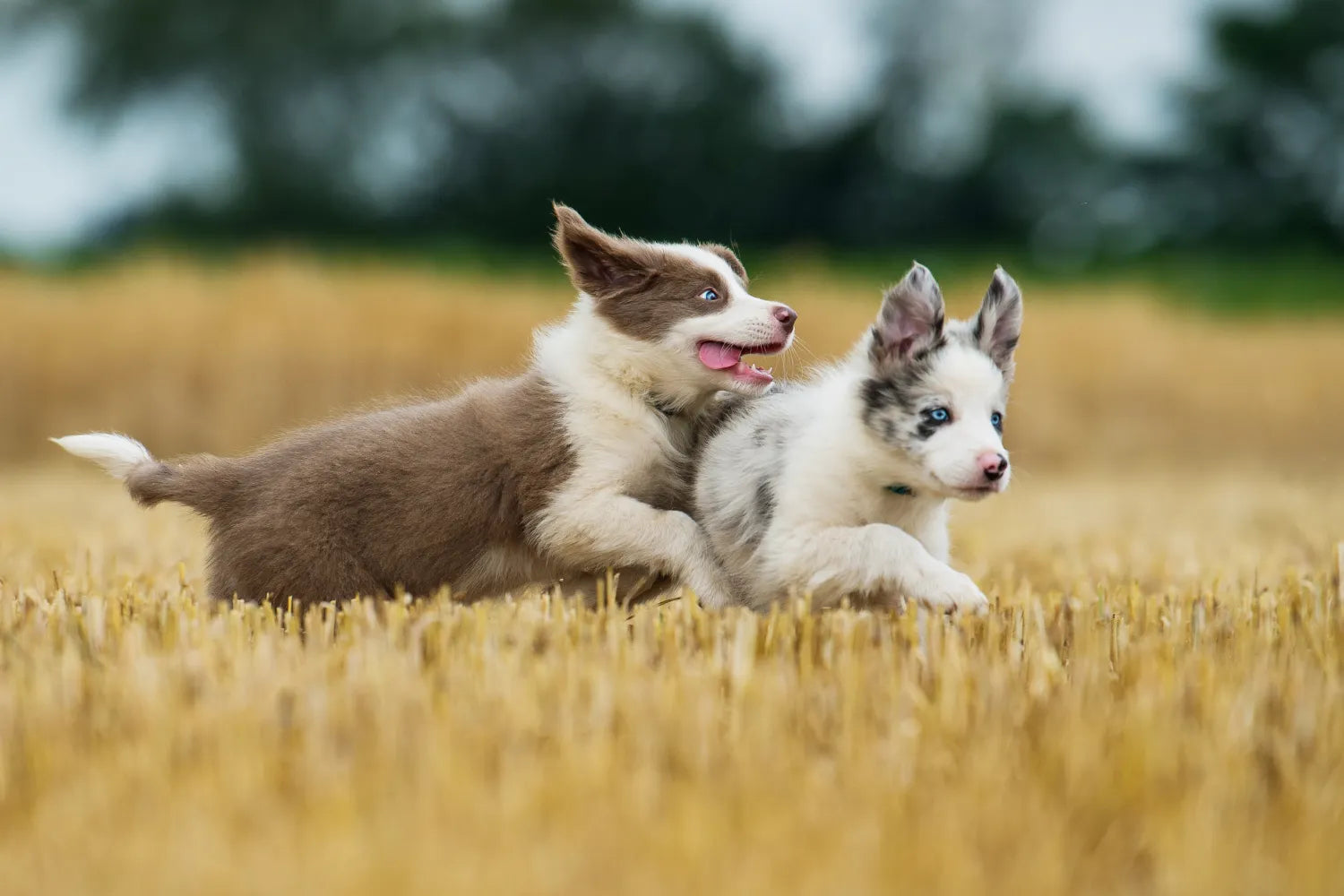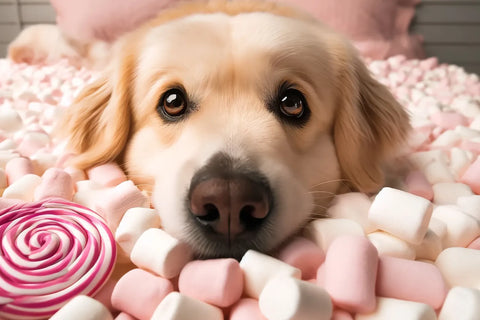
What Happens if a Puppy Eats Adult Dog Food?
Every pup's bowl holds the key to their growth and health, especially during those critical first months. At A Pup Above, we understand that feeding your dog isn’t just about filling their stomach but nurturing their development. That’s why choosing the right food is crucial. But what happens when a puppy nibbles from an adult dog’s dish?
Let's dive into why puppy food isn't just adult dog food in smaller bites and what makes it so essential for your growing pup.
What Makes Puppy Food Different From Adult Dog Food?
Puppy food is to a pup what a tailored nutrient-rich diet is to a budding athlete — vital for optimal growth and health. Puppies have unique nutritional needs that adult dog food simply doesn't meet.
Here’s what sets puppy food apart:
- Higher Protein Content: Puppies are growing rapidly, and just like human children, they need more protein. Puppy food is packed with higher protein levels to support muscle development and growth.
- Enhanced Nutrients: Besides protein, puppies need a blend of specific vitamins and minerals that foster healthy bone and teeth development — calcium and phosphorus being at the forefront. Puppy formulas are enriched with these and other nutrients at levels precisely calculated for their growing bodies.
- Caloric Density: Young pups are energetic little beings that burn a lot of calories. To fuel their play and growth, puppy food offers more calories per bite compared to adult formulas.
- DHA Enrichment: Docosahexaenoic acid (DHA) is an omega-3 fatty acid crucial in brain and vision development. Puppy foods are often fortified with DHA to help ensure their cognitive development is on track.
By choosing food specifically designed for puppies, you’re not just feeding them but supporting their journey toward becoming a healthy, joyful adult dog.
So, What Happens If a Puppy Eats Adult Dog Food?
Imagine a young athlete trying to perform on a diet meant for a less active person — it just doesn't quite match up, right? The same goes for puppies munching on adult dog food.
It's not that it's bad for them in an immediate, dangerous sense, but it's more like wearing shoes that don’t fit. Sure, they can walk around in them, but it’s not exactly comfortable or beneficial in the long run.
Protein
First off, adult dog food isn’t packed with the extra protein a growing puppy desperately needs. Their bodies are in a fast-paced development mode, and without that vital protein, they might not develop as strong or as healthy as they could. Think of protein as the building blocks of your pup's future self — without enough in their diet, they’re kind of short on supplies.
Digestibility
Then there’s the issue of digestibility. Puppies have sensitive tummies. Adult dog food is often harder for them to digest, which can lead to some unpleasant outcomes like tummy troubles or even diarrhea. And nobody wants that, especially not your little furball who doesn’t understand why their stomach is upset.
Nutrients
Nutrient absorption is another hiccup. Even if puppies navigate the digestion part, they might not efficiently absorb all the nutrients from adult dog food. Essential nutrients like calcium and phosphorus are present in different ratios or quantities in adult formulas, which aren’t quite what puppies need for their bones and teeth to develop well.
Energy
Lastly, let's talk energy. Puppies are bundles of energy — playing, exploring, growing — and they need a calorie-rich diet to support all that activity. Adult dog food just doesn’t give them the same fuel boost, which might leave them a bit more sluggish than you’d expect from a lively pup.
So, while a sneaky bite here and there isn’t a disaster, regularly feeding a puppy adult dog food is like sticking to a basic workout routine when you’re trying to train for a marathon — it just doesn’t equip them for the challenges ahead.
Is Fresh Food Better Than Dry Food for Puppies?
When it comes to feeding puppies, the debate between fresh and dry food is a hot topic among dog parents. Fresh, human-grade dog food often stands out as the preferable choice for several compelling reasons.
For starters, fresh food is typically easier for puppies to digest. Those little digestive systems are still developing, and softer, moisture-rich fresh meals can be a big help.
Another big plus is the quality of the ingredients. Fresh food, like the human-grade dishes we craft, uses real meat and veggies — no mysterious "meat byproducts" or fillers.
This means each bite is not only tasty but packed with the nutrients a puppy needs to thrive. Our recipes, like Turkey Pawella and Texas Beef Stew, incorporate wholesome ingredients that provide balanced nutrition without overwhelming a young pup’s system.
Moreover, fresh foods are gently cooked to preserve nutrients that high temperatures often destroy in traditional dry food processing. This method ensures that essential vitamins and minerals remain intact, providing optimal nutritional value. It’s about giving your puppy a meal that's both delicious and nutritionally complete, helping them grow up healthy and strong.
When Should You Switch From Puppy Food to Adult Food?
Deciding when to switch from puppy food to adult food is a significant step in your dog’s life, and it’s not one-size-fits-all. The timing can depend heavily on the breed and size of your dog.
Generally, smaller breeds can transition to adult food sooner, around nine to 12 months, because they mature faster. Larger breeds might need to stick with puppy-specific formulas a bit longer, sometimes up to 24 months, to support their longer growth period.
Here are a few signs that it might be time to switch:
- Physical Maturity: If your puppy has reached what seems to be their full size, they’re likely ready to switch. This doesn’t mean they won’t fill out a bit more, but the major growth spurts have passed.
- Energy Levels: Puppies burn a lot of energy, which is why puppy food is calorie-dense. If you notice a decrease in their hyperactivity levels, it might be time to consider switching.
- Health Recommendations: Always consult with your veterinarian when considering a diet change. They can provide personalized advice based on your puppy’s health, weight, and growth pattern.
Transitioning to adult food should be a gradual process. Start by mixing a small amount of adult food with their usual puppy food, slowly increasing the proportion over several weeks. This slow transition helps prevent digestive upset and allows your puppy to adjust to the new taste and texture of their adult diet.
What Happens If an Adult Dog Eats Puppy Food?
If an adult dog dips into a bowl of puppy food, it’s not a crisis, but it’s not ideal for regular meals. Puppy food is higher in calories and nutrients designed to support rapid growth and development — things that adult dogs don't necessarily need.
This mismatch can lead to weight gain and nutritional imbalances if it becomes a habit. Essentially, while an occasional nibble won't hurt, consistently feeding your adult dog puppy food can set the stage for some health hiccups down the road.
Conclusion
So, what happens if a puppy eats adult dog food? It's not optimal, and while it might not lead to immediate issues, it certainly doesn't provide the tailored nutrition young pups require to flourish.
At A Pup Above, we advocate for feeding your dog age-appropriate, high-quality, human-grade food to ensure they get the best out of their meals at every stage of life. As your pup grows, transitioning them thoughtfully to adult food will support their health and happiness long-term.
Ready to give your dog the best? Explore our range of wholesome, freshly prepared meals that cater to the unique needs of dogs at every life stage. Join us in our mission to nourish your dogs like they truly deserve.
Sources:
Puppy food to adult food | Dog health | Kennel Club
Best Dog Food for Sensitive Stomachs | American Kennel Club
Top Stories

Why Do Dogs Lick Their Paws?

Why Do Dogs Whimper & Make Noises in Their Sleep?

Healthy Vet-Approved Homemade Dog Food Recipes

How To Cook Sweet Potatoes for Dogs






















